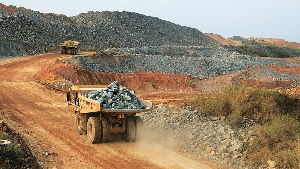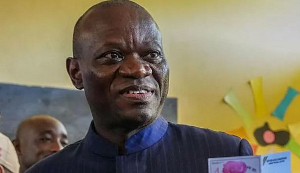Small-scale mining may be seen as a poverty alleviation, but the way it is being operated, it does not look promising. It is ill-favoured.
As a matter of fact, small-scale mining operation is reserved for only Ghanaians (See: subsections (1) of 1989 small-scale mining laws (PNDCL 218) and (2) of section 75 of the Minerals and Mining Law, 1986 (PNDCL 153) and amended Act 2006(Act 703).
Thus, subject to the aforementioned laws, no licence for small-scale gold mining operation shall be granted to any person who is not a citizen of Ghana.
Of course, any person who without a licence granted by the regulatory bodies and undertakes any small-scale gold mining operation contrary to (subsection 1) of section 1 of small-scale mining law; or acts in contravention of any other provision of small-scale mining law in respect of which an offence has not been prescribed, shall be guilty of an offence and shall on conviction be liable to a fine, or to imprisonment for a term not exceeding 2 years or to both.
More significantly, where a foreigner is convicted of an offence under this Law he, shall after paying the fine or serving any imprisonment imposed on him, be liable to deportation under section 13 of the Aliens Act, 1963 (Act 160).
The big question then is, why the influx of foreign infiltrators in the small-scale mining sector?
Shockingly, in spite of the fact that by law, only Ghanaians are allowed to obtain mining licenses for small-scale mining operations, thousands of Chinese and other foreign immigrants are operating in the small scale mining sector in Ghana while the sector regulator—Ghana Minerals Commission sits unperturbed.
Although the small scale mining laws prohibit the use of large explosives, Chinese miners have been allowed to use unstructured methods, and at the same time supplying large explosive, rock crushers and other machines to local miners.
“The involvement of the Chinese has changed the dynamics of small-scale mining,” the head of the Ghana Chamber of Mines, said in an interview.
“They use bulldozers, pay loaders and really heavy machinery. They have in fact mechanized artisanal mining and as a result the level of environmental devastation is huge.”
The fact of the matter is, the activities of the illegal miners have deleterious effect on our environment, therefore the expedient cause of action is for all the stakeholders to work collaboratively and stump the unscrupulous miners from our rural areas.
It is rather unfortunate to hear that some greedy and obnoxious Ghanaians are in the habit of conniving with the Chinese illegal miners to ‘steal’ our natural resources.
“Often, Ghanaians secure plots of land and partner with Chinese who have funds to “bring in the bulldozers and all the other big equipment, and then they go in some sort of working arrangement with the local miners.”
As a matter of fact, I am struggling to find a mild or less euphemistic phraseology to describe the apparent nation wreckers .
To put it forcefully, those scumbags are suffering from the vestiges of slavery. Otherwise, how on earth would they assist illegal immigrants to forcibly dig our natural resources, terrorise the rural dwellers and then wreck the environment?
That said, since the small-scale mining is capital intensive, some Ghanaians will continue to pass on the mining licences to their well-off foreign minions.
If we indeed want to flush out the foreign infiltrators in the small-scale mining sector, we must first institute harsh punishments for the Ghanaians who pass on the mining licences to their foreign minions.
In the grand scheme of things, it is extremely important that the authorities come hard on the recalcitrant Ghanaians who are conniving with the foreigners.
Moreover, Ghana Minerals Commission must Endeavour to provide the necessary education and training for the miners who are in receipt of the small scale mining licenses.
The education and training must focus on the application of structured mining methods, the use of modern technology and safe mining practices.
More importantly, the small scale miners must be given training on the handling and disposal of the hazardous chemicals such as cyanide and mercury.
K. Badu, UK.
Opinions of Thursday, 30 June 2016
Columnist: Badu, K














